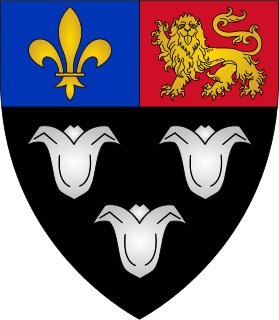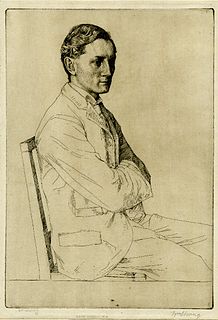
Animal Farm is an allegorical novella by George Orwell, first published in England on 17 August 1945. According to Orwell, the fable reflects events leading up to the Russian Revolution of 1917 and then on into the Stalinist era of the Soviet Union. Orwell, a democratic socialist, was a critic of Joseph Stalin and hostile to Moscow-directed Stalinism, an attitude that was critically shaped by his experiences during the Spanish Civil War. The Soviet Union, he believed, had become a brutal dictatorship, built upon a cult of personality and enforced by a reign of terror. In a letter to Yvonne Davet, Orwell described Animal Farm as a satirical tale against Stalin, and in his essay "Why I Write" (1946), wrote that Animal Farm was the first book in which he tried, with full consciousness of what he was doing, "to fuse political purpose and artistic purpose into one whole".

Mein Kampf is a 1925 autobiographical book by Nazi Party leader Adolf Hitler. The work describes the process by which Hitler became antisemitic and outlines his political ideology and future plans for Germany. Volume 1 of Mein Kampf was published in 1925 and Volume 2 in 1926. The book was edited firstly by Emil Maurice, then by Hitler's deputy Rudolf Hess.

Patriotism or national pride is the feeling of love, devotion and sense of attachment to a homeland and alliance with other citizens who share the same sentiment. This attachment can be a combination of many different feelings relating to one's own homeland, including ethnic, cultural, political or historical aspects. It encompasses a set of concepts closely related to, but mutually exclusive from those of nationalism.
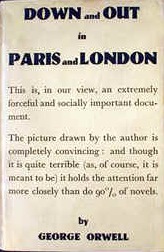
Down and Out in Paris and London is the first full-length work by the English author George Orwell, published in 1933. It is a memoir in two parts on the theme of poverty in the two cities. The first part is an account of living in near-destitution in Paris and the experience of casual labour in restaurant kitchens. The second part is a travelogue of life on the road in and around London from the tramp's perspective, with descriptions of the types of hostel accommodation available and some of the characters to be found living on the margins.

Homage to Catalonia is George Orwell's personal account of his experiences and observations fighting for the Republican army during the Spanish Civil War. The war was one of the shaping events on his political outlook and a significant part of what led him to write, in 1946, "Every line of serious work that I have written since 1936 has been written, directly or indirectly, against totalitarianism and for Democratic Socialism, as I understand it."
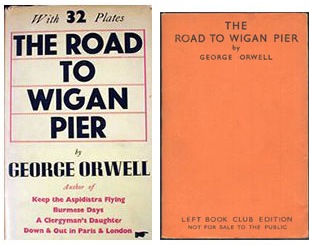
The Road to Wigan Pier is a book by the British writer George Orwell, first published in 1937. The first half of this work documents his sociological investigations of the bleak living conditions among the working class in Lancashire and Yorkshire in the industrial north of England before World War II. The second half is a long essay on his middle-class upbringing, and the development of his political conscience, questioning British attitudes towards socialism. Orwell states plainly that he himself is in favour of socialism, but feels it necessary to point out reasons why many people who would benefit from socialism, and should logically support it, are in practice likely to be strong opponents.
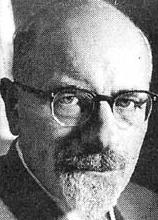
Isaac Deutscher was a Polish Marxist writer, journalist and political activist who moved to the United Kingdom at the outbreak of World War II. He is best known as a biographer of Leon Trotsky and Joseph Stalin and as a commentator on Soviet affairs. His three-volume biography of Trotsky, in particular, was highly influential among the British New Left.
Anarchism in the UK initially developed within the context of radical Whiggery and Protestant religious dissent. During the English Civil War and the industrialisation English anarchist thought developed in the context of revolutionary working class politics.

Land and Freedom is a 1995 film directed by Ken Loach and written by Jim Allen. The film narrates the story of David Carr, an unemployed worker and member of the Communist Party of Great Britain, who decides to fight for the republican side in the Spanish Civil War, an anti-rebel coalition of Socialists, Communists and Anarchists. The film won the FIPRESCI International Critics Prize and the Prize of the Ecumenical Jury at the 1995 Cannes Film Festival. The film was also nominated for the Palme d'Or at Cannes.
"England Your England" is an essay written by the British author George Orwell during The Blitz of 1941 as bombers of Nazi Germany flew overhead. It is his attempt to define British culture and the British people for the rest of the world as he fears that it might soon be wiped from earth by the Nazi armies. He also states that England would not change into a fascist state and cannot unless she is thoroughly broken.
The "London Letters" were a series of fifteen articles written by George Orwell when invasion by Nazi Germany seemed imminent, and published in the American left-wing literary magazine Partisan Review. As well as these "London Letters", PR also published other articles by Orwell.
Notes on Nationalism is an essay completed in May 1945 by George Orwell and published in the first issue of the British "Magazine of Philosophy, Psychology, and Aesthetics" Polemic, in October 1945.
"Politics vs. Literature: An Examination of Gulliver's Travels" is a critical essay published in 1946 by the English author George Orwell. The essay is a review of Gulliver's Travels with a discussion of its author Jonathan Swift. The essay first appeared in Polemic No 5 in September 1946.
"Second Thoughts on James Burnham" is an essay, first published in May 1946 in Polemic, by the English author George Orwell. The essay discusses works written by James Burnham, an American political theorist.

The bibliography of George Orwell includes journalism, essays, novels and non-fiction books written by the British writer Eric Blair (1903–50), either under his own name or, more usually, under his pen name George Orwell. Orwell was a prolific writer on topics related to contemporary English society and literary criticism, whom the British newsweekly The Economist in 2008 declared "perhaps the 20th century's best chronicler of English culture." His non-fiction cultural and political criticism constitutes the majority of his work, but Orwell also wrote in several genres of fictional literature.
National Socialism, more commonly known as Nazism, is the ideology and practices associated with the Nazi Party – officially the National Socialist German Workers' Party – in Nazi Germany, and of other far-right groups with similar aims.
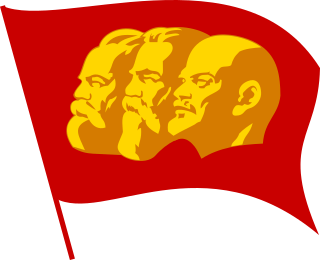
Socialist patriotism refers to a form of civic patriotism promoted by Marxist–Leninist movements. Socialist patriotism promotes people living within Marxist-Leninist countries to adopt a "boundless love for the socialist homeland, a commitment to the revolutionary transformation of society [and] the cause of communism". Marxist-Leninists claim that socialist patriotism is not connected with nationalism, as Marxists and Marxist-Leninists denounce nationalism as a bourgeois ideology developed under capitalism that sets workers against each other. Socialist patriotism is commonly advocated directly alongside proletarian internationalism, with communist parties regarding the two concepts as compatible with each other. The concept has been attributed by Soviet writers to Karl Marx and Vladimir Lenin.



